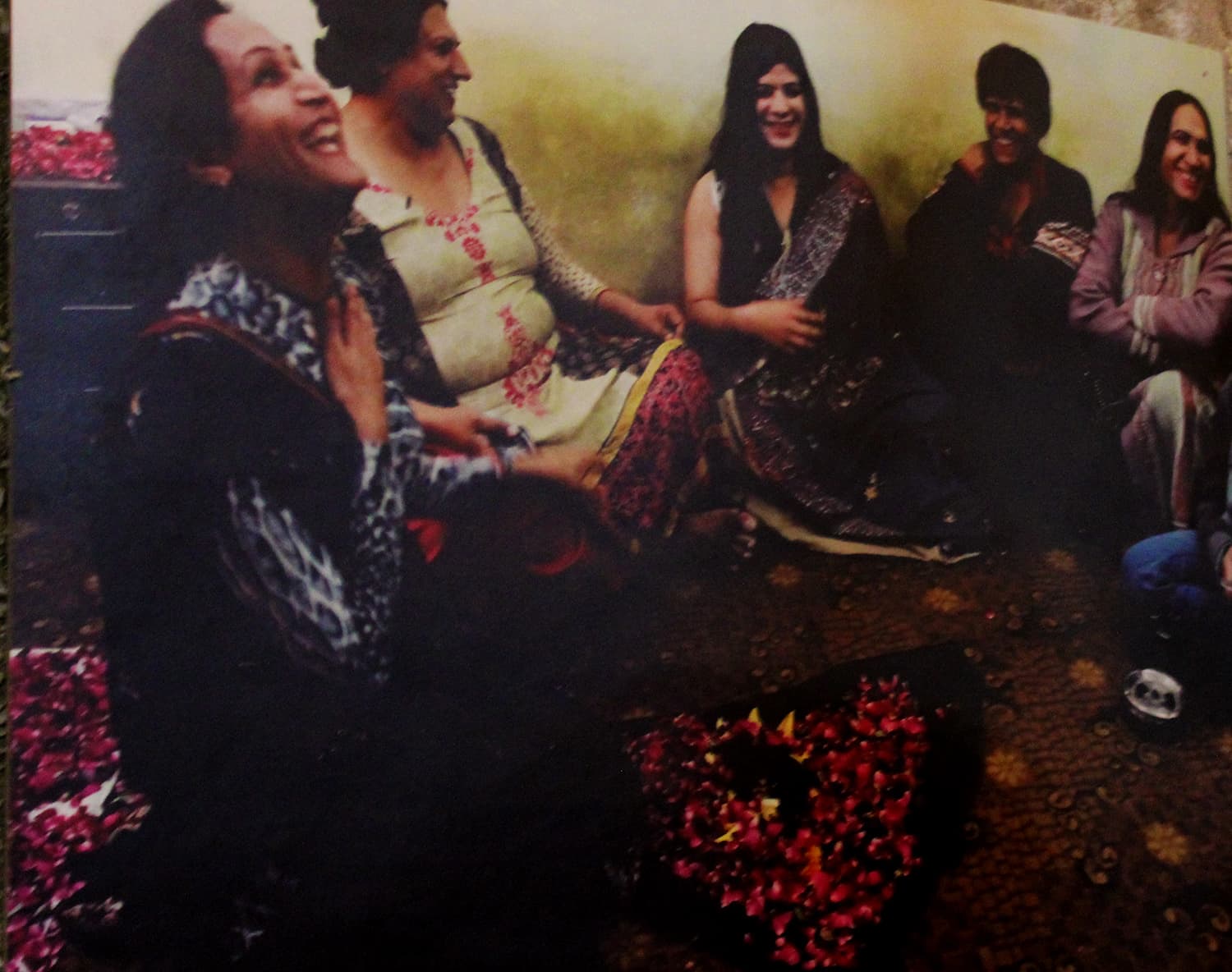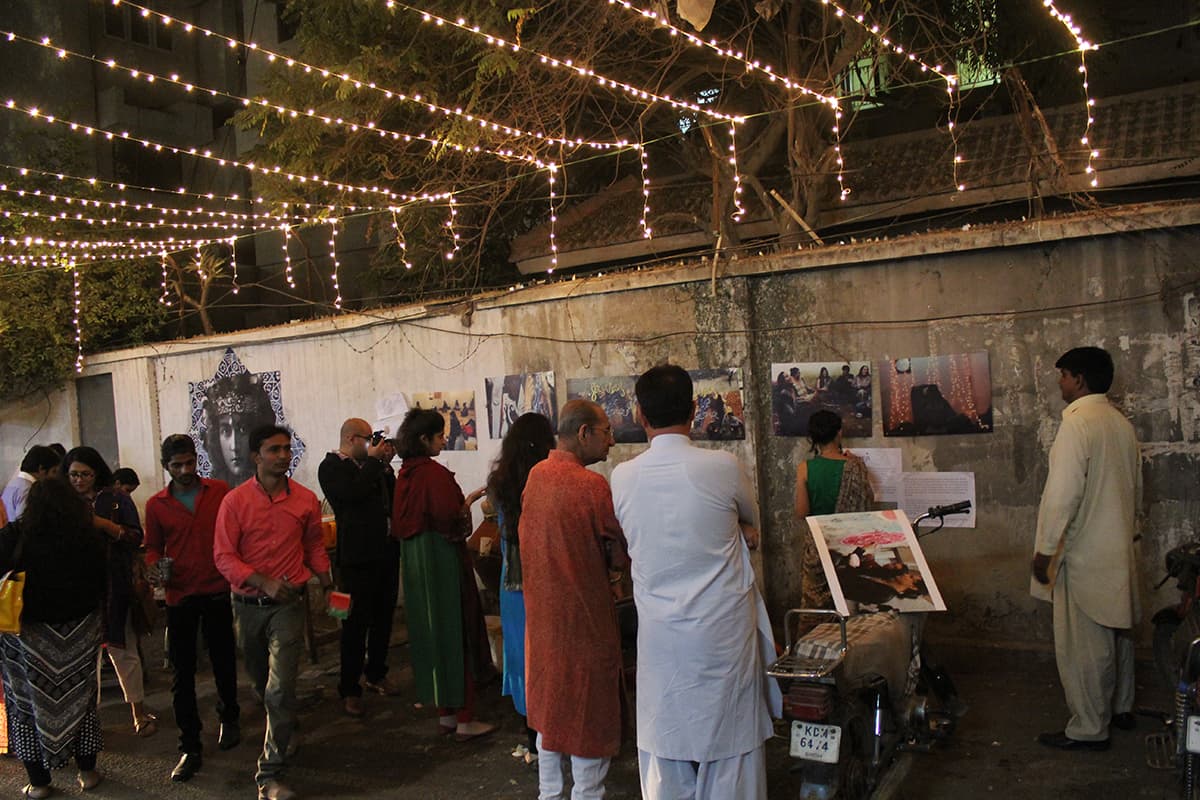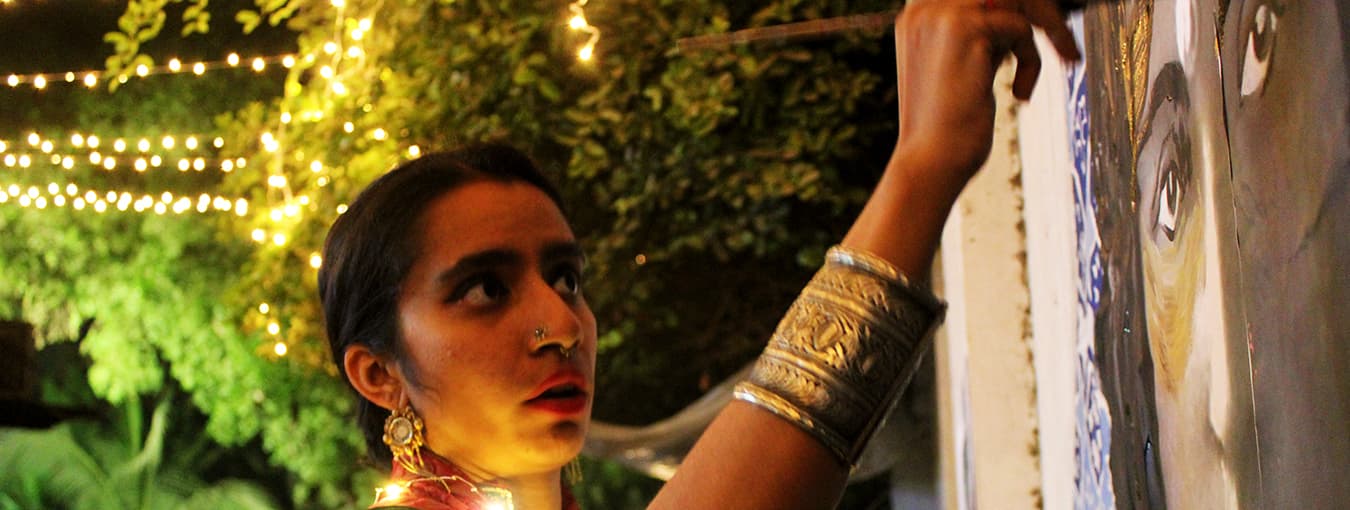Indian campaign The Fearless Collective encourages Pakistanis to conquer fear
In the city of lights, an alley luminous with strings of bright yellow bulbs is usually taken as a sign of a wedding celebration. But on Wednesday, in one of the lone lanes of Clifton, the illumination signaled a different kind of marriage — a marriage of harmony, creativity and resilience as popular campaign The Fearless Collective, led by Indian artist Shilo Shiv Sulaiman finally came to Karachi.
Shilo was invited to Pakistan by Nida Mushtaq, a sexual rights activist and advocate, who was deeply touched by Shilo's poster campaign following the 2012 Nirbhaya gang-rape case in Delhi.
Shilo, after an 11-month struggle to secure a visa, landed in Lahore few weeks ago to expand the campaign to Pakistan. Since then, Nida and Shilo along with filmmaker Haya Fatima Iqbal have visited Lahore, Rawalpindi and Karachi to paint walls and spread the message to all that being fearless is the answer to those who think they are fearsome.
They displayed the fruits of the workshops in the three cities on the exhibit on Wednesday.
Fearless Collective — how it all started
Hailing from Bangalore, Shilo laughs when asked if it was her first time in Pakistan: "It is the first time but definitely not the last."
She talks about the origins of her movement, The Fearless Collective: "I started the initiative in 2012 following the Delhi rape case. I happened to be in Delhi for a wedding when protests broke out, and all of us went out onto the street. I think it was the first time in the history of the country that hundreds and thousands of people were out on the streets — all talking about what happened to Nirbhaya."

But the protests, she tells, also triggered a sense of fear: "There was a lot of fear mongering happening in the media; all you read about was rape. It fetishised the victims: it was about what she was wearing, who was accompanying her. There was a lot of fear, the nuance wasn't there," she laments.
Shilo recounts that the atmosphere soon became very restrictive: "People said, 'Don’t get into a bus, you might get raped', or, 'Don’t talk too loud, you might get raped', and it occurred to me that all of this was counterproductive to the change we needed to see. So I put up a poster on the Internet that said ‘I never ask for it.’"
"I asked everyone who felt the same way to send me their artwork and the response was incredible. Within a week, we received over 400 posters and with each poster an affirmation of fearlessness."
"The real power of the poster was felt when it was out on the street," Shilo continues. "It was wonderful as we would converse with people and it became interactive."

She recalls her first wall painting experience: "I painted my first wall in Banaras, reclaiming divinity as a woman. We are always told to worship the goddess on our walls and we rape the women in our homes, so it was like saying ‘No, you have to treat me the same way’. Three years later, it has evolved into a full fledged platform. We have art therapies as well as theatre and really get into deep emotional personal stories."
Bringing Fearless Collective to Pakistan — a personal story
It was hard to get hold of Nida Mushtaq on the day of the exhibit. She eventually took a break from running around to narrate the process of bringing Shilo and the Fearless Collective to Pakistan: "I was actively following the Delhi rape case when it happened. With protests, news, contributions, I came across one woman’s campaign involving posters that looked so powerful and beautiful at the same time."
"So much so, I printed them and pasted them on my wall, something I wouldn’t have done for any other rape case or protest. But they spoke to you and I have this habit of telling people that their work is admirable so I wrote to Shilo and asked later if she could do the same in Pakistan," she reminisces.

“I told her that I had no money and that maybe she could take a bus from Delhi and come to Pakistan. The visa costs merely 15 rupees. Then we’ll figure out what we’ll do. It was a ten month journey; we kept trying for her visa, arranged for invitations from our partners and we are grateful to Faiz Ghar in Lahore and School of Leadership in Islamabad and Karachi. She got her visa two weeks before she was supposed to visit, so I just told my contacts that we'll be doing this," she laughs.
Fearless in Lahore — *Log Kya Kahain Gay?*
Fearless Collective kicked off in Pakistan during the Faiz Festival in Lahore. The idea was to hold workshops, centred on a theme, that are open for all.
One of the movement's central concerns was talking about the 'inherited words of fear', so their first workshop was based around the phrase 'Log Kya Kahaingay' (What will people say?).

"Both in India and Pakistan, we hear people tell us '‘Log kya kahain gay?' The affirmation then became ‘'Log kya kahain gay, hum he tou log hain, hum kya kahain gay?'," tells Shilo.
Their mural was set to be put up in one of the largest branches of National Bank of Pakistan, except that the management barred them from painting the wall.
"We didn’t exactly have permission to paint initially. As an Indian artist, my first wall was one of the biggest branches of National Bank of Pakistan," chuckles Shilo.
Nida recalls that going to the director to convince him: "I went to the director and told him that you’ve got a huge mural of Sadequain inside. What if it was outside in the public, wouldn’t it be appreciated more because only your staffers can presently see it? He agreed and thus the wall mural came about."
Fearless in Rawalpindi — *Hum hain takhleeq-e-Khuda*
Rawalpindi was one of the most interesting experiences for the trio. After learning that the National College of Arts in Pindi had hired a khuwajasira, they decided to visit the community and held a highly well-received workshop.

They asked the khwajasiras to talk about themselves as individuals.
“We placed coals in the centre and each one would go to the coal and cast off the evil eye (known as ‘nazar utarna’) and then talk about how she perceives herself and how she is perceived by others . In the second part, we set up a wedding throne. One of them would go the throne, wear a dupatta and place her hand on her head and bless herself and ask for blessings. It was extremely moving for all of us,” describes Shilo.

Nida shares that all they wanted was to be accepted and loved like others: “They said ‘hum bhi tou hain takhleeq-e-Khuda (we are also a creation of God). We explained them that ‘bhi’ or ‘also’ showed that they were acknowledging someone else’s presence. We came up with “Hum hain takhleeq-e-Khuda’’ (we are the creation of God).”

Shilo painted the khawajasiras' leader Bubbly, fearless as she is when she rides her bike to work.

“Painting her was intriguing for the onlookers as they first thought [the painting was of] a man because of the bike, then a woman [because of] the shalwar. When they saw a hairy wrist, they were confused, but were joyous and shouted in unison when they realised it was Bubbly, their guru jee,” she recalls.
Fearless in Karachi — Zindagi Kay Khilari
Arriving finally in Karachi last week, the Fearless Collective went to Lyari and proved to all that the area, previously known as a 'no-go' area, was as safe as any other part in the city.
Shilo shares an anecdote we can all relate to: “Funnily enough when I was heading to Pakistan, all of my grandparents who were affected by partition told me, ‘Pakistan mat jana bohat unsafe hai’. Then when I reached Pakistan and was in Lahore, I was told not to visit Karachi because the city is very unsafe. And then finally when I reached Karachi, I was again told that don’t even think about visiting Lyari because it is extremely unsafe. So I realised that there were layers of unsafe and safe."

In Lyari, the theme picked was 'games' or 'khel: "In Lyari we talked about games, the game of life in particular. All of us are always playing with our lives and life is actually a game itself, anything can happen at any point. We asked the children in Lyari to play a game of hopscotch and inquired what made them unsafe when they were on one leg and what made them feel safe when they had both feet on the ground," she elaborates.
“For all the theories about how unsafe Lyari is, I haven’t seen as much joy and life anywhere. So it’s interesting and not to dismiss the series of violence that happened there, it’s like how we are playing with our lives, and in turn we realise that life itself is a game after all," she assures.
The street art scene in Pakistan
With art largely confined to galleries with gleaming glass doors, Fearless Collective feels that there should be public art for those who don't visit exhibitions.
Living in a more conservative society than India, filmmaker Haya Fatima explains the street art scene: “There is a notion that art is not exactly for public, it is limited to galleries. Public art is made to put out art in public spaces and not only that, it also needs to carry a message. If we take street art scene in Pakistan, it is quite repetitive, for instance, there will be major monuments or art representing patriotic and nationalistic elements and it appears that everyone is playing a little safe, which is okay because it’s not a country where you can put anything on the wall.”

“We mustn’t give the message from sitting atop the moral or class pedestal; rather, we should incorporate the voices of the people we want to dedicate the art to,” she adds.
Fearless Collective is here to stay
After docking the Fearless ship in Pakistan, Nida is hopeful about sustaining the project: "We are trying to sustain Fearless and are in touch with a lot of artists to contribute more consistently. We do want to go to other cities as well, including Quetta and Peshawar and we’re hoping to take [the movement] there."

As bikes and trucks passed by, Wednesday's exhibit began buzzing as people started to gather in curiosity about what these women were up to. A young lad from the adjacent dhaba made sure people got their green tea fix. Amidst all this hustle bustle, did Shilo ever feel unsafe even for a little while?
She throws back her head, adjusts the paint brush and grins: “It’s called Fearless Collective for some reason, so we try to live up to our brand name."


Comments